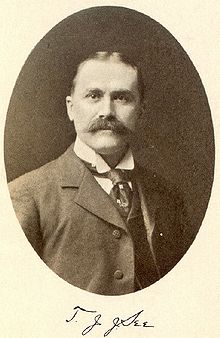
Thomas Jefferson Jackson (T. J. J.) See, (February 19, 1866 - July 4, 1962) was an American astronomer (born near Montgomery City, Missouri), who received his Ph.D. in mathematics from the University of Berlin in 1892 after taking an undergraduate degree from the University of Missouri in 1889. [wikipedia]
See is mentioned by Cayce
The Electrodynamical Wave-Theory of Physical Forces
Vol. I, 1917
by T.J.J. See
pen name - Thomas Joseph Carey
Thos. P. Nichols & Sons, Co. 1917
New Theory of the Ether
Vol. II, 1922
by T.J.J. See
pen name - Thomas Joseph Carey
Thos. P. Nichols & Sons, Co.
8th Memoir on the New Theory of the Ether
by T.J.J. See
Supplement to Vol. II
pen name - Thomas Joseph Carey
Thos. P. Nichols & Sons, Co.
Wave Theory
by T.J.J. See
in 12 books or 14 volumes 1938-1954 pen name - Thomas Joseph Carey
Thos. P. Nichols & Sons, Co.
Diffraction of Light by Progressive Supersonic Waves
Library of Congress 1636 29
Robert Martens, 1950 pp37. Q.
Researches on the Evolution of the Stellar Systems
Library of Congress 523.8 f Se 3
2 volumes
T.J.J. See 1896-1910 Lynn, Mass. (pen name - Thomas Joseph Carey)
pen name - Thomas Joseph Carey
Book X - in three parts ??
T. J. J. See
London - Wheldon & Wesley, Ltd. 1946 482 pages ill.
Nikola Tesla
"The mode of propagation of the currents from my transmitter through the terrestrial globe is most extraordinary considering the spread of the electrification of the surface. The wave starts with a theoretically infinite speed, slowing down first very quickly and afterward at a lesser rate until the distance is about six thousand miles, when it proceeds with the speed of light. From there on it again increases in speed, slowly at first, and then more rapidly, reaching the antipode with approximately infinite velocity. The law of motion can be expressed by stating that the waves on the terrestrial surface sweep in equal intervals of time over equal area, but it must be understood that the current penetrates deep into the earth and the effects produced on the receivers are the same as if the whole flow was confined to the earth's axis joining the transmitter with the antipode. The mean surface speed is thus about 471,200 kilometers per second - fifty-seven per cent greater than that of the so-called Hertz waves - which should propagate with the velocity of light if they exist. The same constant was found by the noted American astronomer, Capt. J.T.T. See, in his mathematical investigations, for the smallest particles of the ether which he fittingly designates as "etherons." But while in the light of his theory this speed is a physical reality, the spread of the currents at the terrestrial surface is much like the passage of the moon's shadow over the globe." [Nikola Tesla]
